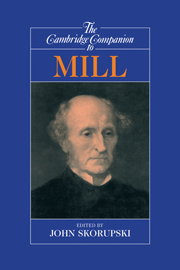Book contents
- Frontmatter
- Introduction
- 1 Mill on language and logic
- 2 Mill, mathematics, and the naturalist tradition
- 3 Mill on induction and scientific method
- 4 Mill, phenomenalism, and the self
- 5 Mill on religion
- 6 Mill on psychology and the moral sciences
- 7 Mill's utilitarianism
- 8 Mill's political economy
- 9 Civilization and culture as moral concepts
- 10 Democracy, socialism, and the working classes
- 11 The subjection of women
- 12 Mill and the Classical world
- 13 The reception and early reputation of Mill's political thought
- 14 Mill in a liberal landscape
- Guide to further reading
- Bibliography
- Index
14 - Mill in a liberal landscape
Published online by Cambridge University Press: 28 May 2006
- Frontmatter
- Introduction
- 1 Mill on language and logic
- 2 Mill, mathematics, and the naturalist tradition
- 3 Mill on induction and scientific method
- 4 Mill, phenomenalism, and the self
- 5 Mill on religion
- 6 Mill on psychology and the moral sciences
- 7 Mill's utilitarianism
- 8 Mill's political economy
- 9 Civilization and culture as moral concepts
- 10 Democracy, socialism, and the working classes
- 11 The subjection of women
- 12 Mill and the Classical world
- 13 The reception and early reputation of Mill's political thought
- 14 Mill in a liberal landscape
- Guide to further reading
- Bibliography
- Index
Summary
Mill's essay On Liberty had both the good and the ill fortune to become a “classic” on first publication. The immediate success of the book, dedicated as it was to preserving the memory of Harriet Taylor, could only gratify its author. Yet its friends and foes alike fell upon it with such enthusiasm that the essay itself has ever since been hard to see for the smoke of battle. That it is a liberal manifesto is clear beyond doubt; what the liberalism is that it defends and how it defends it remain matters of controversy. Given the lucidity of Mill's prose and the seeming simplicity and transparency of his arguments, this is astonishing; ought we not to know by now whether the essay's main target is the hold of Christianity on the Victorian mind or rather the hold of a monolithic public opinion of whatever kind; whether its intellectual basis lies in utility as Mill claimed or in a covert appeal to natural right; whether the ideal of individual moral and intellectual autonomy is supposed to animate everyone, or only an elite; and so indefinitely on?
- Type
- Chapter
- Information
- The Cambridge Companion to Mill , pp. 497 - 540Publisher: Cambridge University PressPrint publication year: 1998
- 27
- Cited by

